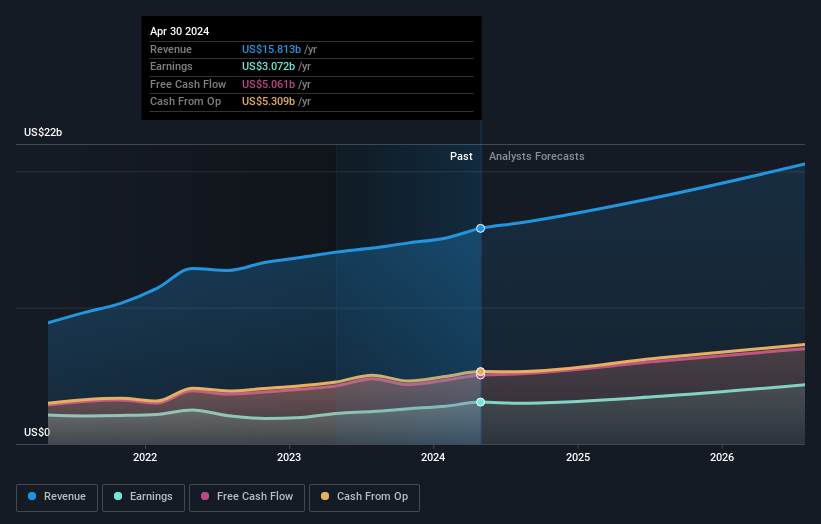- United States
- /
- Software
- /
- NasdaqGS:INTU
Intuit Inc. Beat Analyst Estimates: See What The Consensus Is Forecasting For Next Year
Intuit Inc. (NASDAQ:INTU) shareholders are probably feeling a little disappointed, since its shares fell 8.2% to US$607 in the week after its latest third-quarter results. The result was positive overall - although revenues of US$6.7b were in line with what the analysts predicted, Intuit surprised by delivering a statutory profit of US$8.42 per share, modestly greater than expected. Earnings are an important time for investors, as they can track a company's performance, look at what the analysts are forecasting for next year, and see if there's been a change in sentiment towards the company. Readers will be glad to know we've aggregated the latest statutory forecasts to see whether the analysts have changed their mind on Intuit after the latest results.
View our latest analysis for Intuit

Taking into account the latest results, the current consensus from Intuit's 26 analysts is for revenues of US$18.2b in 2025. This would reflect a meaningful 15% increase on its revenue over the past 12 months. Per-share earnings are expected to swell 13% to US$12.39. In the lead-up to this report, the analysts had been modelling revenues of US$18.0b and earnings per share (EPS) of US$12.13 in 2025. So the consensus seems to have become somewhat more optimistic on Intuit's earnings potential following these results.
There's been no major changes to the consensus price target of US$699, suggesting that the improved earnings per share outlook is not enough to have a long-term positive impact on the stock's valuation. That's not the only conclusion we can draw from this data however, as some investors also like to consider the spread in estimates when evaluating analyst price targets. There are some variant perceptions on Intuit, with the most bullish analyst valuing it at US$760 and the most bearish at US$520 per share. Analysts definitely have varying views on the business, but the spread of estimates is not wide enough in our view to suggest that extreme outcomes could await Intuit shareholders.
Looking at the bigger picture now, one of the ways we can make sense of these forecasts is to see how they measure up against both past performance and industry growth estimates. We would highlight that Intuit's revenue growth is expected to slow, with the forecast 12% annualised growth rate until the end of 2025 being well below the historical 19% p.a. growth over the last five years. Juxtapose this against the other companies in the industry with analyst coverage, which are forecast to grow their revenues (in aggregate) 13% annually. So it's pretty clear that, while Intuit's revenue growth is expected to slow, it's expected to grow roughly in line with the industry.
The Bottom Line
The biggest takeaway for us is the consensus earnings per share upgrade, which suggests a clear improvement in sentiment around Intuit's earnings potential next year. Happily, there were no real changes to revenue forecasts, with the business still expected to grow in line with the overall industry. There was no real change to the consensus price target, suggesting that the intrinsic value of the business has not undergone any major changes with the latest estimates.
Following on from that line of thought, we think that the long-term prospects of the business are much more relevant than next year's earnings. We have forecasts for Intuit going out to 2026, and you can see them free on our platform here.
You can also view our analysis of Intuit's balance sheet, and whether we think Intuit is carrying too much debt, for free on our platform here.
The New Payments ETF Is Live on NASDAQ:
Money is moving to real-time rails, and a newly listed ETF now gives investors direct exposure. Fast settlement. Institutional custody. Simple access.
Explore how this launch could reshape portfolios
Sponsored ContentNew: AI Stock Screener & Alerts
Our new AI Stock Screener scans the market every day to uncover opportunities.
• Dividend Powerhouses (3%+ Yield)
• Undervalued Small Caps with Insider Buying
• High growth Tech and AI Companies
Or build your own from over 50 metrics.
Have feedback on this article? Concerned about the content? Get in touch with us directly. Alternatively, email editorial-team (at) simplywallst.com.
This article by Simply Wall St is general in nature. We provide commentary based on historical data and analyst forecasts only using an unbiased methodology and our articles are not intended to be financial advice. It does not constitute a recommendation to buy or sell any stock, and does not take account of your objectives, or your financial situation. We aim to bring you long-term focused analysis driven by fundamental data. Note that our analysis may not factor in the latest price-sensitive company announcements or qualitative material. Simply Wall St has no position in any stocks mentioned.
About NasdaqGS:INTU
Intuit
Provides financial management, payments and capital, compliance, and marketing products and services in the United States.
Outstanding track record with flawless balance sheet.
Similar Companies
Market Insights
Weekly Picks

Early mover in a fast growing industry. Likely to experience share price volatility as they scale


A case for CA$31.80 (undiluted), aka 8,616% upside from CA$0.37 (an 86 bagger!).


Moderation and Stabilisation: HOLD: Fair Price based on a 4-year Cycle is $12.08
Recently Updated Narratives

Automotive Electronics Manufacturer Consistent and Stable

Airbnb Stock: Platform Growth in a World of Saturation and Scrutiny

Adobe Stock: AI-Fueled ARR Growth Pushes Guidance Higher, But Cost Pressures Loom
Popular Narratives


Crazy Undervalued 42 Baggers Silver Play (Active & Running Mine)


NVDA: Expanding AI Demand Will Drive Major Data Center Investments Through 2026


The AI Infrastructure Giant Grows Into Its Valuation
Trending Discussion




